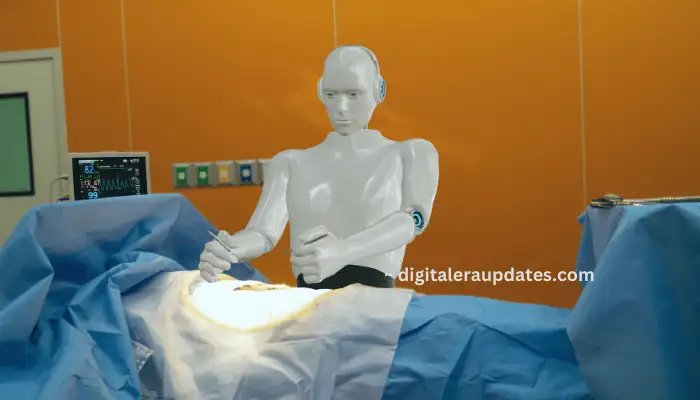The medical world (and basically EVERYTHING else) is being rocked by the new developments in Artificial Intelligence (AI). As a matter of fact, AI is already pretty good at certain medical jobs. But before you go imagining robots taking over your local doctor’s office, what does this mean for all of us?
Flashback to your initial doctor’s visit? You may have been a skittish child with bloody knees or simply an anxious teenager struggling to get past the lingering cough. The last thing you wanted was a doctor who treated their practice as if it were something they have to do instead of what they get the opportunity to do. It is empathy, the superpower of doctors – or it should be. Cancer diagnoses on screens, no one wants to read those.

Empathy and the Doctor
Medical school is a rigorous field of study, as is practice. Doctors devote years of training to memorizing mounds of information. This priority of science over empathy can also lead to an almost total lack of compassion.
AI-as-air: Enter the trusty teammate
Think of AI as a turbo-charged research assistant, sifting through mountains and mountains of medical data looking for correlations or connections. Helping doctors practice the sentimental slice of medicine that AI so desperately lacks. Think about this, do you ever get ready for a race and grab the whole encyclopedia with you? It helps by taking some of the weight off a doctor’s shoulders so that they can put 110% into what actually matters: you and your health.
What AI Can Do To Help Improve Patient Care
This is how AI can truly be a doctor’s best friend:
Better Choices: By digging deeper into endless piles of data, it can give some options based on successful treatments for identical cases (sometimes even special treatment designed specifically to fit you and your genes). Doctors take this, add it to their clinical experience, and sprinkle lots of empathy – VIOLA, a custom plan is born. Combining data with compassion — that is the jackpot!
Reduced Errors: Everybody makes mistakes, but AI can be trained with pinpoint accuracy which could mean fewer misdiagnoses and treatment errors. That translates to a faster road to recovery for you, the patient.
Everyone Could Use a Little Help Sometimes: Access to health care can be hard for everyone. The AI-powered chatbots can work as a helper to another runner at the race, giving you directions and advising on medical in remote regions.
The Core Of Health Care
Back in brief, the doctor-patient relationship is all about health care.
Listen: You need a doctor who will listen to your worries and fears, along with the rest of your story. Your doctor needs this complete information as much as a great running buddy listens to your litany of complaints about that sore ankle.
Coach In Your Corner: Fitness could be a marathon, no longer a dash. To you who become so dang excited at the finish line, a lot goes on in this world of health that maybe just quite simply could not happen without those cheering crowds.
Steer the Ship: Medical options are not always cut and dry. It enables doctors to take into account your personal context, the way you live and think as well as some amount of medical knowledge which only helps in their experience. And then, there’s something that AI still can’t quite do.
The Patient Factor (no, really)
We are used to thinking of medical treatment as a cure administered by the health professional – and that can set us up for disappointment. Have they been convinced of treatment? Do they feel optimistic? It is very much a self-fulfilling prophecy since the attitude of a patient has been shown to drastically shape how their treatment will play out. Whether or not they are compliant with a protocol. Once again, AI can assist in daily reminders and tracking (or any technology for that matter).
A Future of Collaboration
The future of trade isn’t doctors vs. robots. This is a collaborative effort between patients, doctors, and AI towards one goal – to be part of the winning team. AI does the numbers and some of the thinking, doctors do all of the human work so you feel heard as patients; a health care system that works where it needs to (objective information gathering) and is most important in areas which AI cannot replicate yet. That, my friends, is a race worth competing in!
Conclusion
The rise of AI in health care will strengthen the tools and abilities doctors currently have, which patients can only benefit from. Thus, with the power to process data AI brings, combined with a human doctor’s instinct and experience wielding empathy for future improvement, we create an all-around caring health-care environment. AI and doctors are not working to replace human interaction, but rather augment it for better patient care.
